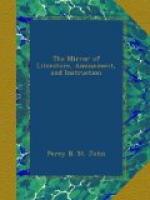Or when the crystal star of Even
Is mirror’d in the silent
sea,
And we can almost deem that heaven
Derives its calmest smile
from thee.
Oh, virgin, if the lute
Invokes thy name in song,
Be thine the only voice that’s mute,
Amid the tuneful throng.
When battle waves her falchion gory,
Over the dead on sea or land,
And one proud heart receives the glory,
Won by the blood of many a
band,
If the hero’s prayer to thee,
From his fading lips be given,
Awake his heart to ecstacy,
With brightest hopes of heaven.
Madonna! on whose bosom slumber’d,
The infant, Christ, with sunny
brow,
The viewless hours have pass’d unnumber’d,
Since we adored thy shrine
as now;
But not the gorgeous sky,
Nor the blue expansive sea,
To us such beauty could supply,
As that which hallow’d
thee!
And when the scenes of life are faded
From our dim eyes like phantom-things,
When gentlest hearts with gloom are shaded,
And cease to thrill at Fancy’s
strings,
Thou, like the rainbow’s
form,
When summer skies are dark,
Shalt give thy light amid the storm,
And guide the Wanderer’s
bark!
G.R. Carter.
* * * * *
ANIMAL AND VEGETABLE FOOD.
“For my part I do much
admire, with what soul or with what
appetite the first man, with
his mouth touched slaughter, and
reached to his lips the flesh
of a dead animate.”—Plutarch.
We ought not perhaps to insist too much on the opinions of the heathen philosophers, because the extension of knowledge, and a more matured experience, has shown the fallacy of many of their notions; but if we were permitted to lay any stress on the authority of these celebrated men, we might bring forward a mine of classical learning in commendation of a vegetable diet; we might point to the life of a Pythagoras, or a Seneca, as well as to the works of a Plato, and show how the wisest among the ancients lived, as well as thought, with regard to this subject.
But we shall be contented, as far as authority is concerned, to rest our claims to attention, rather upon that which bears a more modern date, and to bring forward the evidence of facts instead of the theories of ingenuity. The subject itself we may venture to hope, though a little homely, is not without interest, and certainly not unimportant. It is somewhat scientific from its very nature, and so far from being a matter confined to the medical faculty, it is one on which every man exerts, every day of his existence, his own free choice, as far indeed as custom has allowed him the exercise of that freedom.




